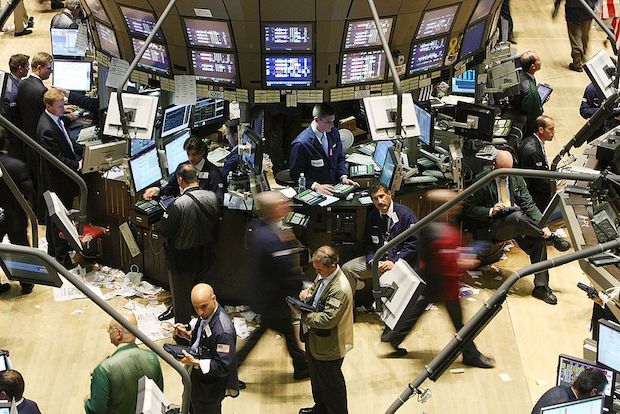The ‘Great Hurricane’, Maggie Thatcher, Michael Jackson and shoulder pads – it must be the 30th anniversary of Black Monday.
What was ‘Black Monday’?
On 19 October 1987, global stock markets experience heavy falls. In the space of 24 hours, the Dow Jones Industrial Index (DJIA) fell 22.6%, destroying the previous record one-day fall of 12.8% set during the Wall Street Crash of 28 October, 1929.
Asia and Europe all suffered huge falls of up to 23%. The UK’s leading benchmark index closed down 10.84% at 2052.3 on the 19 October 1987, only to fall further by 12.22% at 1801.6 the following day.
Some stock market commentators have since attributed ‘Black Monday’ to worries about a slowing global economy, high stock valuations and a computer glitch, but it is difficult to pin the cause onto any one particular factor.
Five years after ‘Black Monday’
In the five years following the crash, stock markets made a strong recovery, according to global investment manager, Schroders.
US stock prices grew by 14.7% a year. UK and European stock markets rose at rates of 8% and 7.6%, respectively, while global stock markets as a whole, posted annual gains of 6.3%. The Japanese stock market was the notable exception – a banking crisis left investors facing annual average falls of 7.2%.
The chart below illustrates the performance of stocks before, during and after Black Monday.

The blue column shows the annual rate of return for stocks in the five years leading up to the crash.
The dark green column is the percentage change in stocks on Black Monday.
The light green column is the annual rate of return in the five years after Black Monday.
Will ‘Black Monday’ ever happen again?
This question is on most investors’ lips.
Chris Bailey, global multi-asset fund manager and founder of Financial Orbit (a global investment research consultancy) says:
‘Stock market crashes akin to ‘Black Monday’ happen once every couple of decades despite the best efforts of stock market regulators and politicians to stop them from happening.
‘The reality is that the forces of euphoria and greed are too omnipresent in the world of investment for anything but semi-regular crashes to exist. Of course, the precise transmission mechanism of the crash changes every time reflecting investor trends, the use of technology and geographic differences.’
David Buik, market commentator at investment bank Panmure Gordon, is slightly more cautious when it comes to the likelihood of another ‘Black Monday’:
‘One should never say never, but markets are very much more sophisticated today than they were 30 years ago.’
‘The reason for the sell-off in 1987 was well chronicled – lack of liquidity, particularly junk bonds, programme trading, and frothy interest rates. Thirty years ago, programme trading using technology was embryonic and stop-losses were not very fashionable; so, a huge momentum built up behind those liquidating their portfolios and those just selling stock.’
‘Fund managers have a much greater hand on shareholder registers and therefore have greater control. Investors are happy to ‘vent their spleens’ on a particular stock, as we have seen recently with Provident Financial, Imagination Technology and Merlin Entertainment, but retribution on an entire market would be very hard to orchestrate unless there was something like a nuclear war or fall-out.’
How stock market valuations compare

In 1987 there was a more obvious path for investors to take to protect their money. In government bonds they could still find a healthy return as well as the required protection for their investment.
The yields on 10-year government bond yields in developed countries such as Japan, Germany and the US were as much as 9.9%. In the UK, the figure was 10.1%. Today the highest yield among those countries, is 2.9% for US bonds. In the UK it is 1.28%, while Germany and Japan are closer to zero.
How government bond yields compare: 1987 and 2017

But if we were to experience another global stock market crash akin to ‘Black Monday’, can an investor profit from it?
Buik thinks it is difficult to capitalise on a stock market crash ‘unless you were one of the initiators which sold the market.’
Buik adds: ‘Judgement and timing are everything. Investors tend to make more money when the [stock] market was oversold – as was the case post-Iraq war in March 2003, for example or when quantitative easing (QE) was introduced on March 9 2009.’






Comments